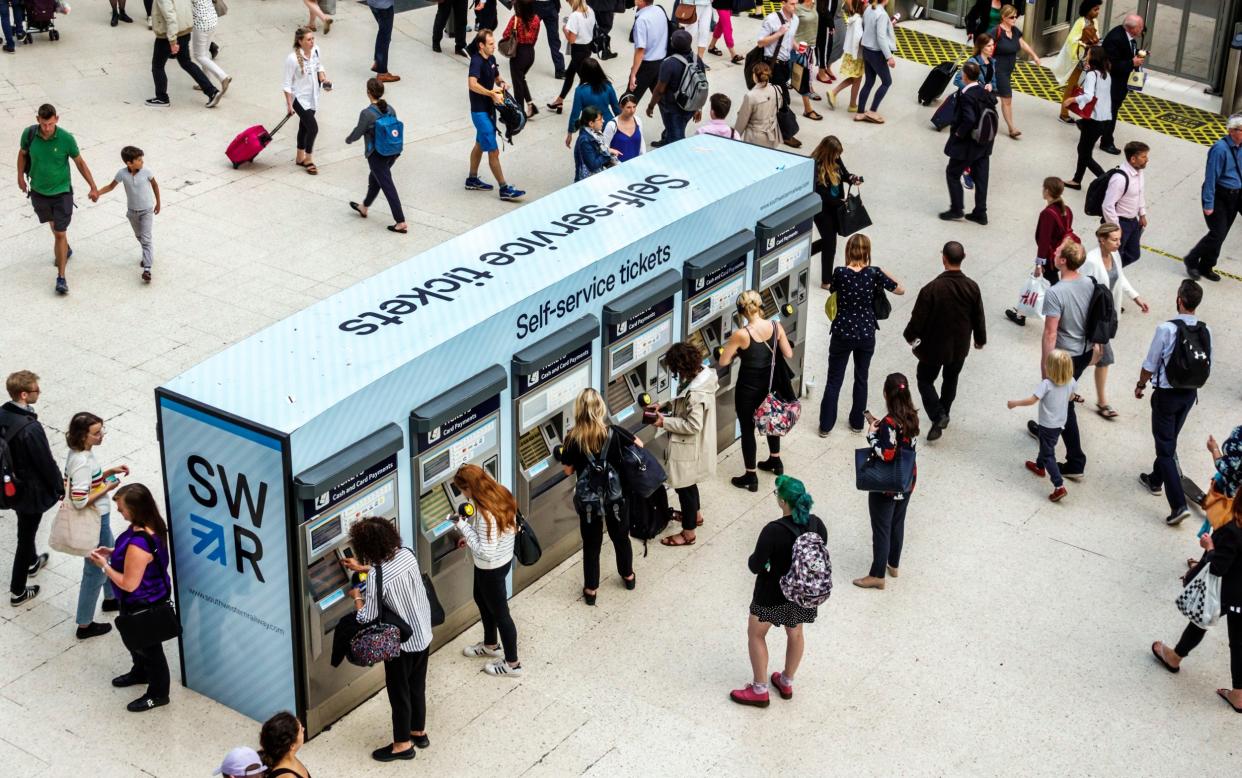10 tips and tricks for saving money on UK rail fares

Bad railway news comes with far greater frequency than rail upgrades – or, for that matter, trains.
Two days ago we were informed that LNER, the government-owned firm that operates the East Coast main line, was scrapping off-peak tickets and introducing Uber-style surge pricing. Yesterday, we were informed about Aslef’s planned industrial action for January and February.
Today, consumer group Which? has reported that ticket machines at railway stations charge passengers more than double what they would cost online for some journey – and that the best value fares are either unavailable or hidden among a confusing mire of options on many machines.
Following a year of strikes, delays, cancellations, weather-related chaos and staff shortages on the network – and the small matter of the cancellation of HS2 – regulated rail fares will increase by 4.9pc from March 3, 2024. Adding a fiver and a bit to a typical Manchester-London mid-range ticket might not sound too egregious, but for a commuter, already hammered by inflation on everyday outgoings, almost five per cent can add up to hundreds of pounds per year. The increase could add £190 to an annual season ticket from Woking to London, taking the cost from £3,880 to £4,070.
Last March, rail fares were increased by 5.9pc. In the same month, the Government axed its plan to introduce a rail pass for British people to boost domestic tourism. The scheme – announced in 2021 at the height of the Covid-era staycation boom – was intended to emulate the BritRail pass VisitBritain issues to foreign visitors – but the DCMS, in its wisdom, decided natives wouldn’t benefit from unlimited journeys across England, Wales and Scotland.
What, then, are those of us who are still foolish enough to be fond of trains – in spite of all the hassles and angst – meant to do to save cash? There is hope, so long as you do the rail-users equivalent of The Knowledge and learn to compare before you click.
Railcards
National Rail offers nine different railcards, ranging from 16-25, 26-30 and over-60s deals offering a third off, to a Family & Friends Railcard that gets 60 per cent off the price for any 5-15 year olds in the group. The Two Together Railcard can save couples up to £129 per year.

Advance booking
By booking an Advance ticket, you can secure an average saving of up to 61 per cent on a “walk-up fare”. Advance tickets are valid exclusively on the date and train specified but they can represent significant savings on long journeys. For instance, a London Euston-Liverpool Lime Street ticket for mid-March costs from £50 return (two advance singles). That’s, compared with £145.40 for two off-peak singles. And an anytime single is a whopping £171.30.
Advance tickets generally go on sale 12 weeks before your date of travel, though Grand Central Advance fares are available up to 26 weeks in advance between London and any of the company’s calling points in Yorkshire and the North East. National Rail hosts a Booking Horizons page, showing the furthest date in the future you can buy advance tickets for each train firm today.
All Advance tickets are singles, and are sold in limited numbers, subject to availability and on a first come, first served basis. The RDG says “up to half a million Advance tickets are released each week for less than £10”, but they get scooped up fast.
Get to know other ticket types
Off peak, Anytime, Season, Flexi, Rangers and Rovers, Oyster and Contactless: who knew there were so many? Have a browse here, but, basically, Anytime is for business travellers, while Off peak and Advance are for the rest of us.
Class is a slightly more nuanced affair, as first-class deals are often available for little or no extra on Advance tickets – and the website should pop this option up as you’re booking. In general, Off-Peak hours begin at 9.30am from Monday to Friday in cities and large towns, and at 9am everywhere else.
Where there is more than one Off-Peak fare for your journey, the cheaper fare – with more restrictions – is the Super Off-Peak. Off-Peak and Super Off-Peak Day tickets are only valid on the date shown on your ticket, and Off-Peak and Super Off-Peak Returns are valid for one month from the date shown on your ticket.
Whoever came up with the “Super” bit is probably the person who made some returns 10p more than singles; in February 2023, Transport Secretary Mark Harper said returns would be scrapped to simplify things. Watch this space.

Split tickets
About ten years ago, there was a lot of media commotion and a wee bit of excitement when companies like trainsplit.com – quickly joined by splitticketing.com, ticketysplit.com and others – started spreading what rail fans and official fare-manual nerds had known for years – that rail journeys in Great Britain are not always priced on mileage. A “split ticket” is simply an A to E ticket divided into, in this example, five sections, A-B, B-C, C-D, D-E.
You know who bought split tickets because they had a wad of orange tickets in their shirt pocket and can be seen changing seats at places like Cheltenham – because often the same train can be used even when the leg of the journey and ticket are “new”.
Sometimes – and this is insane, but true – it can be cheaper to buy a ticket for a longer distance that you mean to go. For example, some tickets for journeys through London have been found to be cheaper than those ending in London, to the delight of spotters.
A word of caution. When travelling using Advance tickets, the small print says: “You may not start, break and resume, or end your journey at any intermediate station except to change to/from connecting trains as shown on the ticket(s) or other valid travel itinerary.” The jargon is “stopping short” and doing it carries a potential fine, but you could only get caught alighting early if the guard jumped off too and dragged you back on.
Consider changing your route
It’s long been cheaper to hop on a stopper from Gatwick to London rather than riding in the Gatwick Express, aimed at jetlagged air travellers. It can sometimes be wise to check on alternative routes for longer trips. Clitheroe-London involves two changes and costs £77.70 one way.
But the bus fare to Preston is currently £4 thanks to the extension of the Government’s bus fare cap scheme and Preston-London return is £35 – simply because Advance tickets are still available. Plugging in routes and dates is tedious but it can be worth hundreds of pounds if you’re travelling as a family.

Change your date
Weekends might be off-peak for commuters, but demand is often huge (and Network Rail loves doing repairs when the rest of us are not at work). Consider travelling mid-afternoon on Friday or, even better, Thursday evening, and returning on Monday. Also, avoid obvious peak periods: bank holidays, school holidays, university holidays, Christmas and New Year.
If you are using one of the classic holiday routes (e.g. down to Devon and Cornwall, or into Blackpool), get ready to book as soon as Advance tickets go on sale – 24 weeks with GWR, just the measly 12 with Avanti.
Get a free alert when tickets go on sale
Trainline, the booking website, wants your details. In return it operates a ticket alert system for specific journeys. You’ll get an email when advance tickets for that journey go on sale, which are usually the cheapest fares. That said, it’s best to avoid third-party websites when purchasing, as they typically charge extra. Trainline has a booking fee though its website page on fees is artfully vague; a page on business accounts specifies a fee of 75p for transactions up to £35.00 and £1.50 for all others ie most.
Look out for one-off special deals
Sign up for rail firm’s promotional emails or keep an eye on MoneySavingExpert’s coach and train deals page.
Book with London North Eastern, wherever you’re heading. The site doesn’t charge booking fees or for first class postage. It has an e-ticket option if you prefer that, and its trains have sockets so your ticket won’t die while you travel.
Catch the bus
If all else fails, Megabus has tickets at short notice from London to Liverpool at £7.99. It’s a 7 hour 55 minute schlep, with stops at Heathrow, Reading and Birmingham, but the price is competitive.
This story was first published in April 2023 and has been revised and updated.


